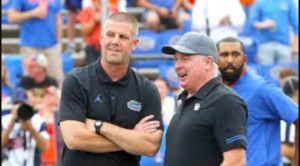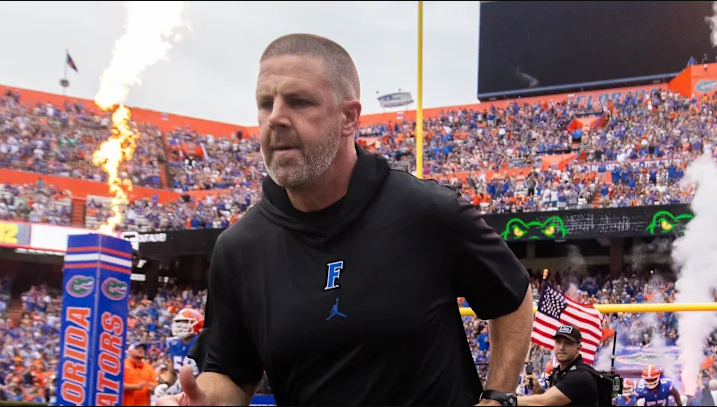Highly Conflicting: True or False?: Florida should Hire Mark Stoops, not Lane Kiffin, if Billy Napier Fired
True or False?: Florida should hire Mark Stoops, not Lane Kiffin, if Billy Napier fired

If the University of Florida decides to part ways with head coach Billy Napier, the decision about his successor could hinge on a choice between two intriguing candidates: Lane Kiffin and Mark Stoops. Each coach brings a distinct set of skills, philosophies, and potential impacts to the program. The debate over which coach is the better fit for Florida has ignited discussions among fans and analysts alike, with opinions often polarized based on individual priorities for the Gators’ future.
As the Gators continue to struggle, the hot seat for Napier has become increasingly warm. The recent performances have led many to speculate on the direction of the program, especially in light of competitors like Auburn, where Hugh Freeze is making waves. The stakes have never been higher, and if Florida does indeed make a change, the choice between Kiffin and Stoops will be critical.
Lane Kiffin has become synonymous with high-octane offenses and a dynamic approach to coaching. His tenure at Ole Miss has seen the program achieve impressive heights, and he has proven adept at attracting talent and maximizing the potential of his players. The notion that Kiffin could pivot to Florida, especially if he fails to lead Ole Miss to the playoffs this season, is a tantalizing prospect for many. With a roster that many consider among the most talented in the country, falling short of playoff expectations could push Kiffin to seek new challenges, particularly one as storied as Florida.
There’s a sense that Kiffin’s style aligns well with what Florida fans crave. The Gators have a rich history of explosive offenses, dating back to the days of Steve Spurrier. Kiffin embodies that spirit, bringing an entertaining, fast-paced game plan that could reignite the fanbase’s passion. Adams, an ardent supporter of Kiffin’s candidacy, posits that Kiffin’s natural fit for the job is hard to overlook. “If he doesn’t make the playoff with his best Ole Miss roster, he’ll pivot to something new,” Adams argues. The prospect of Kiffin stepping into the Florida spotlight excites many who remember the glory days of Gators football.
Toppmeyer echoes this sentiment, suggesting that the disappointment of not making the playoffs would be a catalyst for Kiffin to move on. “How do you look yourself in the mirror after falling short of the playoff with this roster? You don’t. You smash the mirror and move to Florida, where Gators fans would celebrate Kiffin as a kindred spirit to Steve Spurrier,” he explains. This idea paints a picture of Kiffin as not only a potential hire but also a coach who could understand the demands of the Gators’ passionate fanbase.
However, the conversation isn’t solely about Kiffin. Mark Stoops, currently at Kentucky, has been an impressive figure in the SEC, consistently developing competitive teams despite the challenges posed by more traditional powerhouses. His experience in the conference and ability to build a program from the ground up makes him a viable candidate in the eyes of many. Stoops has instilled a sense of toughness and discipline at Kentucky, qualities that could benefit the Gators if they opt for a more grounded approach to rebuilding.
Yet, Adams and Toppmeyer both argue that Stoops may not align with what Florida fans are truly seeking. Adams dismisses the notion that Stoops would be the right fit, emphasizing that Florida fans desire entertainment as much as they do victories. “Stoops isn’t the answer to those desires,” he asserts. This perspective speaks to the broader expectations surrounding the Florida program, where the legacy of exciting football is an integral part of its identity.
Toppmeyer adds to this viewpoint by contending that Kiffin is more than just an offensive innovator; he possesses the unique ability to invigorate a program both on and off the field. With the modern landscape of college football increasingly influenced by NIL (Name, Image, and Likeness) deals, Kiffin’s experience in leveraging such opportunities for player recruitment could give Florida a much-needed edge. “Florida needs a coach to flip the roster and inspire NIL giving,” Toppmeyer notes, highlighting Kiffin’s track record at Ole Miss in attracting top talent and boosting player engagement.
Moreover, Kiffin’s charisma and media-savvy persona resonate with a younger demographic of fans and recruits. In today’s era of college football, where social media plays an outsized role, having a coach who can connect with recruits and maintain a strong public presence is invaluable. Kiffin has demonstrated a knack for engaging with fans and the media in a way that not only promotes his program but also builds a sense of community among supporters. This skill set could be instrumental for Florida, especially as they aim to compete in a crowded recruiting landscape.
While Stoops brings stability and proven success, the question remains: will that be enough for a program like Florida, which is accustomed to competing at the highest levels? Some might argue that Stoops’ approach could yield long-term success, focusing on player development and a strong foundation. However, in the immediate sense, Florida may find itself craving the excitement and flair that Kiffin offers.
Furthermore, the contrasting styles of Kiffin and Stoops could have a significant impact on the culture of the program. Kiffin’s offensive genius and tendency to take calculated risks might attract a different type of player—those looking for a creative environment where they can showcase their talents. On the other hand, Stoops might appeal to athletes who value structure, discipline, and a more traditional football ethos. This cultural fit could influence recruitment and the overall trajectory of the program for years to come.
As discussions swirl around the future of Florida football, it’s essential to consider not just the short-term outcomes but also the long-term vision for the program. If the Gators choose Kiffin, they may be signaling a desire to reclaim their place among college football’s elite through an aggressive, entertaining style of play. Conversely, a hire like Stoops could indicate a commitment to building a resilient and competitive team, focusing on development and consistency.
Both paths have their merits, and the decision ultimately boils down to what the Florida administration envisions for the program. Will they prioritize immediate excitement and high-profile recruiting, or will they opt for a measured approach that values stability and a strong foundation? The choice is a reflection of the broader narrative surrounding college football, where programs are constantly evolving in response to the changing landscape.
If the Gators find themselves in a position to make this pivotal choice, it will undoubtedly have lasting implications for the future of the program. As they weigh the potential of Kiffin versus Stoops, they must also consider the expectations of their fanbase, the competitive realities of the SEC, and the ever-evolving nature of college football.
Ultimately, the decision on who to hire will define not only the next chapter of Florida football but also its identity moving forward. Whether they choose the dynamic, risk-taking approach of Lane Kiffin or the steady, disciplined mindset of Mark Stoops, the outcome will have a profound impact on the Gators’ quest for success in a rapidly changing landscape. The future of Florida football is on the line, and how they navigate this pivotal moment will determine the course of their program for years to come. As the tension mounts, fans can only wait and see which direction their beloved Gators will take.
